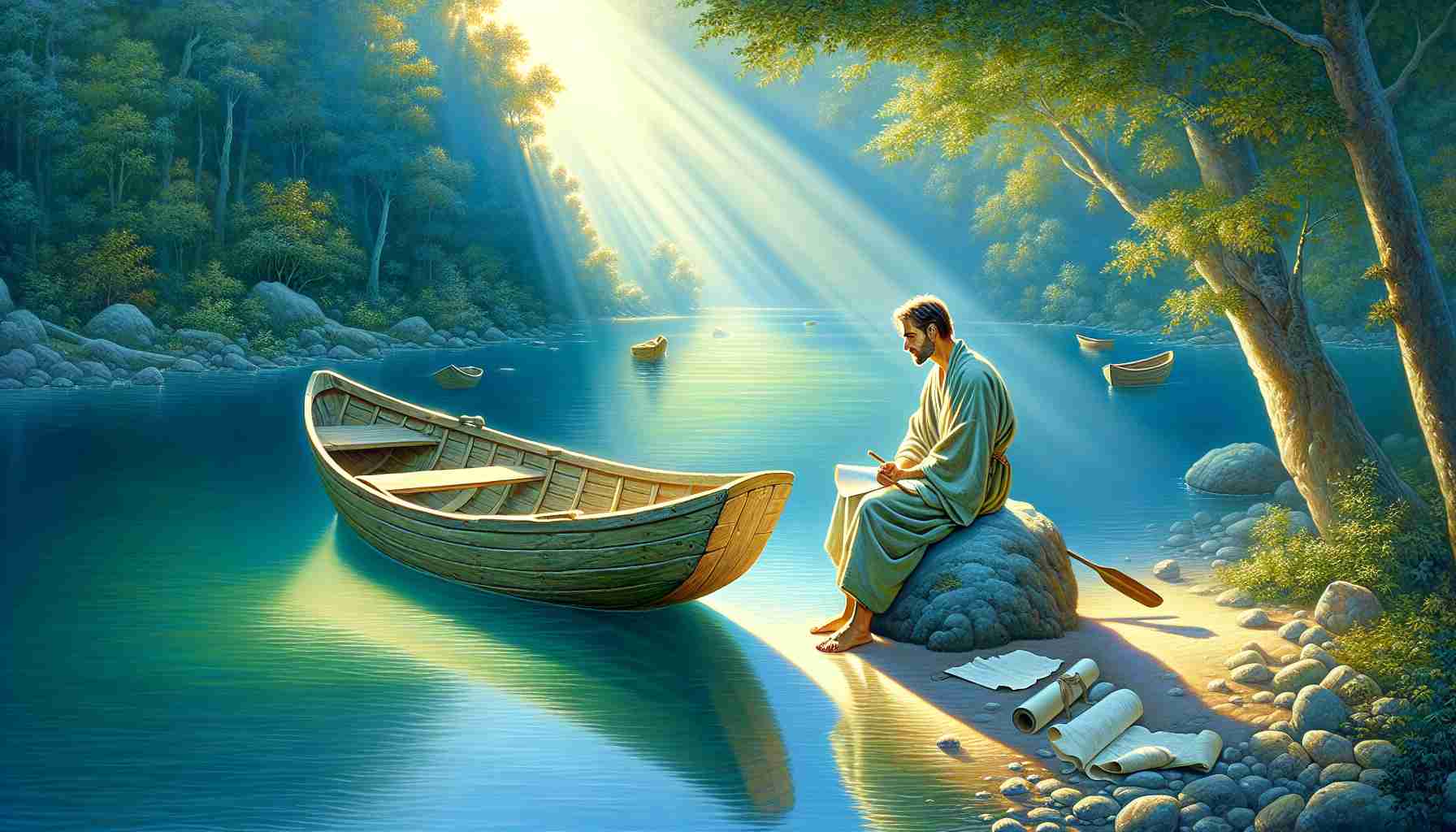

The sun was high when my boat drifted to the middle of the river. The air was soft. The water was still. I had taken the little boat out to be alone. I was angry. Very angry.
That morning, I had argued with a merchant in town. He said I was slow. That I had no sense. I shouted back. Words flew like sharp pebbles, cold and mean. My chest burned even after I walked away. So I came to the water to think.
I closed my eyes and listened to the river. Then—bump!
Another boat hit mine from the side.
I jumped up, ready to yell again. “Who dares to—”
But when I looked, I stopped.
The boat was empty.
Just a small fishing boat with no oars and no one inside. Maybe the wind or the current had pushed it. It floated there, gently bobbing, harmless.
I sat down slowly, watching it bump my boat again. I didn’t feel angry anymore.
That’s when I remembered a story my grandfather told me. He had been a reader of the Tao—the ancient writings about the Way, by a wise man named Laozi. Grandfather loved telling me stories from what he called “Dao De Jing,” which means The Book of the Way and Its Power.
“This story is called The Empty Boat,” he had said. “Zhuangzi, the Taoist sage who lived long after Laozi, told it best. If a man’s boat is struck in the fog, and there’s someone in the boat, he gets angry. But if it’s empty—he just laughs.”
I laughed too now, thinking of that. The empty boat didn’t mean harm. It just floated with the river.
Grandfather used to say, “People are like boats on the river. Sometimes they bump into each other. But if you understand they are just moving with the current, you don’t get so mad. Anger comes when we think others are doing wrong on purpose. But sometimes—they’re just empty boats.”
I looked out at the sky. Clouds moved slowly. A bird flew high, steady and quiet. No struggle, no rush—just the flow of things.
The Tao teaches about Wu Wei—doing without forcing. About living simply, like water that flows without trying. Today, that little boat had taught me the same.
I sat long into the afternoon, the wind brushing my face, soft and calm. No longer angry. No longer shouting. Just breathing.
When I rowed back to shore, the trees seemed greener. The world felt lighter. The merchant's words didn’t sting anymore. They were just another bump on the river.
I didn’t change overnight. But now, whenever something upsets me, I remember the empty boat. I try not to push the river. I try to let it carry me.
And slowly, I’m learning to float.
The sun was high when my boat drifted to the middle of the river. The air was soft. The water was still. I had taken the little boat out to be alone. I was angry. Very angry.
That morning, I had argued with a merchant in town. He said I was slow. That I had no sense. I shouted back. Words flew like sharp pebbles, cold and mean. My chest burned even after I walked away. So I came to the water to think.
I closed my eyes and listened to the river. Then—bump!
Another boat hit mine from the side.
I jumped up, ready to yell again. “Who dares to—”
But when I looked, I stopped.
The boat was empty.
Just a small fishing boat with no oars and no one inside. Maybe the wind or the current had pushed it. It floated there, gently bobbing, harmless.
I sat down slowly, watching it bump my boat again. I didn’t feel angry anymore.
That’s when I remembered a story my grandfather told me. He had been a reader of the Tao—the ancient writings about the Way, by a wise man named Laozi. Grandfather loved telling me stories from what he called “Dao De Jing,” which means The Book of the Way and Its Power.
“This story is called The Empty Boat,” he had said. “Zhuangzi, the Taoist sage who lived long after Laozi, told it best. If a man’s boat is struck in the fog, and there’s someone in the boat, he gets angry. But if it’s empty—he just laughs.”
I laughed too now, thinking of that. The empty boat didn’t mean harm. It just floated with the river.
Grandfather used to say, “People are like boats on the river. Sometimes they bump into each other. But if you understand they are just moving with the current, you don’t get so mad. Anger comes when we think others are doing wrong on purpose. But sometimes—they’re just empty boats.”
I looked out at the sky. Clouds moved slowly. A bird flew high, steady and quiet. No struggle, no rush—just the flow of things.
The Tao teaches about Wu Wei—doing without forcing. About living simply, like water that flows without trying. Today, that little boat had taught me the same.
I sat long into the afternoon, the wind brushing my face, soft and calm. No longer angry. No longer shouting. Just breathing.
When I rowed back to shore, the trees seemed greener. The world felt lighter. The merchant's words didn’t sting anymore. They were just another bump on the river.
I didn’t change overnight. But now, whenever something upsets me, I remember the empty boat. I try not to push the river. I try to let it carry me.
And slowly, I’m learning to float.